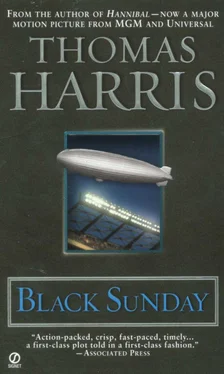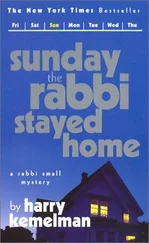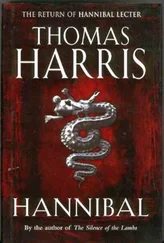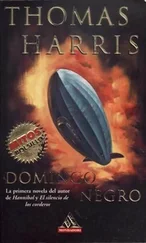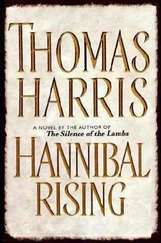Tonight it carried the hunter. He was a broad-shouldered man in a tan suit, and he was seated on the aisle just behind the wing. The stewardess was collecting fares. He handed her a new fifty-dollar bill. She frowned at it. “Don’t you have anything smaller?”
“For two fares,” he said, indicating the big man asleep beside him. “For his and mine.” He had an accent the stewardess could not place. She decided he was German or Dutch. She was wrong.
He was Major David Kabakov of the Mossad Aliyah Beth, the Israeli Secret Service, and he was hoping the three men seated across the aisle behind him had smaller bills with which to pay their fare. Otherwise the stewardess might remember them. He should have tended to it in Tel Aviv, he thought. The connection at Kennedy Airport had been too close to permit getting change. It was a small error, but it annoyed him. Major Kabakov had lived to be thirty-seven because he did not make many errors.
Beside him Sergeant Robert Moshevsky was snoring softly, his head back. On the long flight from Tel Aviv, neither Kabakov nor Moshevsky had given any sign of recognition to the three men behind them, though they had known them for years. The three were burly men with weathered faces, and they wore quiet, baggy suits. They were what the Mossad called a “tactical incursion team.” In America they would be called a hit squad.
In the three days since he had killed Hafez Najeer in Beirut, Kabakov had had very little sleep, and he knew that he must give a detailed briefing as soon as he reached the American capital. The Mossad, analyzing the material he brought back from the raid on the Black September leadership, acted instantly when the tape recording was played. There was a hurried conference at the American embassy and Kabakov was dispatched.
It had been clearly understood at the Tel Aviv meeting between American and Israeli intelligence that Kabakov was being sent to the United States to help the Americans determine if a real threat existed and to help identify the terrorists if they could be located. His official orders were clear.
But the high command of the Mossad had given him an additional directive that was flat and unequivocal. He was to stop the Arabs by whatever means necessary.
Negotiations for the sale of additional Phantom and Sky-hawk jets to Israel were at a critical stage, and Arab pressure against the sale was intensified by the Western shortage of oil. Israel must have the airplanes. On the first day that no Phantoms flashed over the desert, the Arab tanks would roll.
A major atrocity within the United States would tip the balance of power in favor of the American isolationists. For the Americans, helping Israel must not have too high a price.
Neither the Israeli nor the American state departments knew about the three men sitting behind Kabakov They would settle into an apartment near National Airport and wait for him to call. Kabakov hoped the call would not be necessary. He would prefer to handle it himself, quietly.
Kabakov hoped the diplomats would not meddle with him. He distrusted both diplomats and politicians. His attitude and approach were reflected in his Slavic features—blunt but intelligent.
Kabakov believed that careless Jews die young and weak ones wind up behind barbed wire. He had been a child of war, fleeing Latvia with his family just ahead of the German invasion and later fleeing the Russians. His father died in Tre blinka. His mother took Kabakov and his sister to Italy in a journey that killed her. As she struggled toward Trieste, there was a fire inside her that gave her strength while it consumed her flesh.
When Kabakov remembered, across thirty years, the road to Trieste, he saw it with his mother’s arm swinging diagonally across his vision as she walked ahead, holding his hand, her elbow, knobby in the thin arm, showing through her rags. And he remembered her face, almost incandescent as she woke the children before the first light reached the ditch where they were sleeping.
In Trieste she turned the children over to the Zionist underground and died in a doorway across the street.
David Kabakov and his sister reached Palestine in 1946 and they stopped running. By the age of ten he was a courier for the Palmach and fought in the defense of the Tel Aviv-Jerusalem road.
After twenty-seven years of war, Kabakov knew better than most men the value of peace. He did not hate the Arab people, but he believed that trying to negotiate with Al Fatah was a lot of shit. That was the term he used when he was consulted about it by his superiors, which was not often.
The Mossad regarded Kabakov as a good intelligence officer, but his combat record was remarkable and he was too successful in the field to be put behind a desk. In the field, he risked capture and so he was necessarily excluded from the inner councils of the Mossad. He remained in the intelligence service’s executive arm, striking again and again at the Al Fatah strongholds in Lebanon and Jordan. The innermost circle of the Mossad called him “The final solution.”
No one had ever said that to his face.
The lights of Washington wheeled beneath the wing as the plane turned into the National Airport traffic pattern. Kabakov picked out the Capitol, stark white in its floodlights. He wondered if the Capitol was the target.
The two men waiting in the small conference room at the Israeli embassy looked carefully at Kabakov as he entered with Ambassador Yoachim Tell. Watching the Israeli major, Sam Corley of the Federal Bureau of Investigation was reminded of a Ranger captain of twenty years ago, his commander at Fort Benning.
Fowler of the Central Intelligence Agency had never been in the military service. Kabakov made him think of a pit bull. Both men had studied hastily assembled dossiers on the Israeli, but the dossiers were mostly concerned with the Six-Day War and the October War, old Xeroxes from the CIA’s Middle East section. Clippings. “Kabakov, the Tiger of Mitla Pass”—journalism.
Ambassador Tell, still wearing his dinner clothes from an embassy function, made brief introductions.
The room fell silent and Kabakov pressed the switch on his small tape recorder. The voice of Dahlia lyad filled the silence. “Citizens of America…”
When the tape had ended, Kabakov spoke slowly and carefully, weighing his words. “We believe that the Ailul al Aswad—Black September—is preparing to strike here. They are not interested in hostages or negotiations or revolutionary theatrics this time. They want maximum casualties—they want to make you sick. We believe the plan is well advanced and that this woman is a principal.” He paused. “We believe it likely that she is in this country now.”
“Then you must have information to supplement the tape,” Fowler said.
“It is supplemented by the fact that we know they want to strike here, and the circumstances in which the tape was found. They have tried before,” Kabakov said.
“You took the tape from Najeer’s apartment after you killed him?”
“Yes.”
“You didn’t question him first?”
“Questioning Najeer would have been useless.”
Sam Corley saw anger in Fowler’s face. Corley glanced at the file before him. “Why do you think it was the woman you saw in the room who made the tape?”
“Because Najeer had not had time to put it in a safe place,” Kabakov said. “He was not a careless man.”
“He was not careful enough to keep you from killing him,” Fowler said.
“Najeer lasted a long time,” Kabakov said. “Long enough for Munich to happen, Lod Airport, too long. If you are not careful now, American arms and legs will fly.”
“Why do you think the plan would go on now that Najeer is dead?”
Corley looked up from the paper clip he was examining and answered Fowler himself. “Because the tape was dangerous. Making it would have been very nearly the final step. The orders would have been given. Am I right, Major?”
Читать дальше
